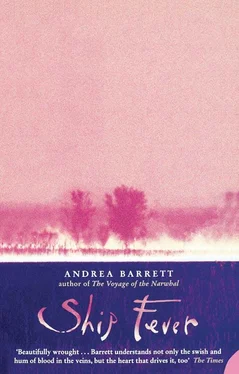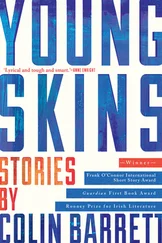“Maybe next year,” I said. “Maybe I’ll come for a visit, once I figure out what I’m doing.”
“Maybe I won’t be here by then,” Bianca said.
We promised to write and hung up, disappointed with each other. Honestly I think we have felt this way since our last conversation with Suky. Hallucination, perhaps; but if it was we shared it. Since then, though, we have found it almost impossible to share anything.
I moved back here after that phone call and rented an apartment that I only kept for a little while. Then I did two things even more distasteful to Bianca: I got a job teaching chemistry to sophomores and juniors at the school Bianca and I had attended, and I moved into a house in the village, with Harry Mazzullo and the white dog.
Harry is, was, my father’s lawyer. The white dog is not the one Bianca and I saw by the creek in Boston but one of the dogs my father cherished. The other dog is dead; when I tracked down the family who’d taken him from the pound, they told me he’d barked uncontrollably until they’d had to put him down. But one day, shortly after I moved back, I found the white dog by accident as I was walking through the village. He was sprawled on a broad porch, looking completely at home, and when I knocked on the door of that house Harry opened it and greeted me as if he knew me.
“Rose?” he said. “Rose Marburg?”
When I nodded he said we’d been introduced at my father’s funeral. I didn’t remember this; I remembered almost nothing of that day. Bianca and I had been in the back of the church, as if we were guests and not daughters, while our father’s widow had accepted condolences up front. At the cemetery we had stood at a distance, talking to no one, and then we had left. When could Harry have met me?
But he swore he had. And when I said, “How did you get that dog?” he said he’d had it for more than a year. “Your father’s wife,” he said. “After the funeral she was so…confused. She was making a lot of decisions very fast, and I was worried about the dogs — your father was very attached to them.”
“I know,” I said.
“They’d gone to the pound. I’m sure she didn’t mean to do that, but she was under a lot of pressure. By the time I got there the brown one was gone, but no one wanted this one and so I took him home myself.”
All this time, it turned out, the dog had been safely with Harry. Harry took me out to dinner that night, and a week later he took me sailing. Cool water, a gentle breeze, a bottle of wine. This is where the shameful part comes in. Already I had sketched our history for him, and I’d told him the story of the wild night Bianca and I once shared in Boston. But while we were out on the lake, while I was relaxed, a little drunk, almost hypnotized by the water, I told him about the vision Bianca and I had had, which in different ways had caused both of us to move.
Harry sat quite still and listened, only his hands moving on the tiller and the sheets. I told the story just as I remembered it, a dialogue in which I played both parts. My mother’s questions I rendered high and thin and soft; our responses lower, slower, doubled. Two sisters speaking simultaneously with one voice.
Harry didn’t shrug or make a face or look at me as if I were crazy. How calm he was, how cool. Perhaps his years as a lawyer have exposed him to stranger things. He said, “That’s interesting. I knew your mother a little, when I was a boy. She was quite a woman. So were your great-aunts, for that matter. That was one of your great-aunts, wasn’t it? The woman who moved in with you?”
“It was,” I said. “She took care of us.” We were not, apparently, going to pass judgment on either the scene with Suky or the way I’d rendered it.
“I remember,” Harry said. “And when she was sick, I remember that you and Bianca took care of her.”
A few months later, he asked me to move into his house and I accepted. I live with Harry because of the way he absorbed my story; because he was good to my father near the end; because he tells me tales about my father’s last days that I would otherwise have no way of knowing. Tit for tat, my secrets for his. It’s not much of an excuse to say that perhaps I sensed this was what I’d gain.
Five weeks passed between the time Bianca and I last saw our father and the time we returned for his funeral. During those weeks I was back in Boston and Bianca was in Dixon, New Mexico, where she was working on a garlic farm. During those weeks, Harry said, some strange things happened.
Bianca and I had envisioned our father the way we’d last seen him — how could we imagine anything else? Guilty, horrified, we’d imagined him alone. On a Friday night, we had left that house together: both afraid, it seems to me now, that the one left behind would never find the strength to leave again. Or maybe both afraid that the one left behind might somehow gain the upper hand. And then there was also, beyond these fears, the problem of our father’s wife.
Leaving, we had told ourselves that she was due home within the hour. By then we’d realized that our father wanted her, not us; our fussing and cleaning and cooking only tired him, and none of it led to what he wanted. He welcomed the filth, we had come to see, and the signs of his abandonment. He believed these signs would sway his wife and bind her to his side for his remaining days. Each night of our visit she’d called, and the change in his voice when he talked to her had been unbearable to us. By the time we left, we almost understood that all our efforts had only postponed the moment when he might have his wish. The clean house we left behind meant his wife could feel free to leave again come Monday.
But we’d buried that thought beneath our need to feel that we’d done some good; in our departure, finally, we acted with one mind. Only back in our own worlds could we see the ambiguous nature of what we’d given him. Alone, we said to each other, when we learned she’d disappeared again. How could we leave him alone ? But while it’s true that his wife left after that weekend visit and didn’t return for good until three weeks later, the fact is that even then he wasn’t alone. There was a nurse with him for several hours each day: I spoke with her frequently on the phone and always felt relieved after hearing her voice. She was strong and practical and had a nice laugh. She bathed our father, and washed his sheets and changed his bed and cooked some meals.
Bianca and I thought his wife had hired the nurse, meaning by this to prove that she was capable and we weren’t needed. But Harry told me a group of our father’s old friends had been responsible.
“What friends?” I said. We had not known that our father was that close to anyone. He golfed with a group of men: other winemakers from the valley, a doctor, a dentist, a broker. They had never seemed like more than drinking buddies.
But Harry said they’d rallied when it became clear that my father was dying. They hired the nurse, he said. They rented a gadget that would buzz in their homes if my father pressed a button for help. And they paid, Harry said, for my father’s funeral. Harry claims that Peter Couperin — the same Couperin who’d figured in our mother’s stories as our father’s greatest rival, but who’d been hardly more than a name for us — organized the other men, and that together they did what they could to ease our father’s last days.
Perhaps he was more than a name. I remembered Couperin, vaguely, as a red-faced man who spoke too loudly. When Bianca and I were young he used to visit our house sometimes; always, after he left, our father would make fun of him and his pink Catawba. They’d had an argument when Bianca and I were in college, over some land that Couperin had sold to a real-estate developer. I wasn’t aware that they’d seen each other much after that.
Читать дальше
Конец ознакомительного отрывка
Купить книгу












